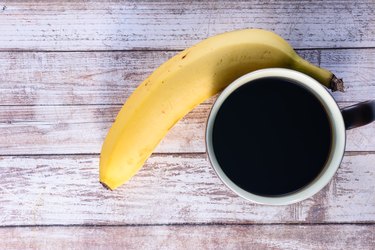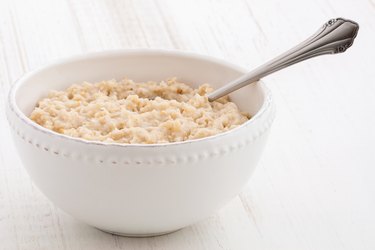
When you start a new weight-loss plan, it's common to experience cravings, especially for sweets, as you adjust to a shift in your daily diet. But if your pining for sugar persists, you might need to take a closer look at your weight-loss strategy.
We enlisted the expertise of Jaclyn London, RD, CDN, head of nutrition and wellness at WW, to learn how your behaviors might unintentionally contribute to candy and cookie cravings. Below, London shares six mistakes that may tempt your sweet tooth, plus offers advice on how to cut down on cravings and slash your sugar intake.
Video of the Day
Video of the Day
1. Grabbing a Light Breakfast
Your morning fuel sets the tone for the day. So, if you have fruit or a piece of toast in place of a proper breakfast, expect to feel hunger pangs and sense your sugar lust sooner rather than later.
"Starting off the day with a nutrient-dense meal empowers you to keep making satisfying, nutritious choices throughout the day without feeling too stuffed or getting too hangry," London says.
London even recommends making breakfast your biggest meal of the day. "Or at least, think about making it bigger by adding an extra source of protein (an extra egg or a piece of fruit is a good place to start!) to help shut down the urge to graze later on in the day," she says.
Eating this way might even rev up your metabolism. Indeed, consuming more calories in the a.m. (versus a hearty dinner) may help boost your metabolism, thwart high blood sugar and obesity, keep your appetite in check and nix sweet cravings, according to a February 2020 study published in the Journal of Clinical Endocrinology & Metabolism.
Related Reading
2. Skipping Meals
When you're trying to stick to a certain calorie count, you might be tempted to skip a meal to ensure you stay within (or below) your budget. But this is a bad idea. Slashing too many calories may trigger your body to switch into protective mode — to guarantee you're getting enough calories to cover your basic functions — and thus slow down your metabolism.
People working on weight-loss goals also tend "to cut back or limit the amount of food they eat earlier on in the day to 'save up' and eat more later on, but often, I see this backfire big time," London says. That's because if you're ravenous, you're bound to binge on high-calorie, fatty or sugary foods to satiate your appetite.
In fact, hoarding your calories for nighttime can impact your metabolism. The same Journal of Clinical Endocrinology & Metabolism study noted that when you eat a substantial breakfast, you use up more than double the energy (i.e. twice the calories) in the morning to digest your food than if you consume the same number of calories at dinner.
London's advice: "Stick to a consistent schedule of regular meals and snacks that satisfy you." This way you'll feel full throughout the day and, consequently, you're less likely to fall prey to sugar cravings.
3. Eating Unbalanced Meals

"Did you ever notice that certain foods can keep you full for what seems like forever, where others leave you hungry in just an hour? Turns out, there is a scientific explanation for that," London says.
"Research suggests that both protein and fiber have the power to help you stay fuller longer," she explains. Case in point: High-protein diets were linked to greater satiety, weight control and preservation of lean muscle mass in a November 2014 study in Nutrition & Metabolism.
And when your stomach is sated with the proper nutrients, you can stave off sugar cravings. London recommends food combinations that "provide both lean protein and filling fiber" like oatmeal with peanut butter and blueberries at breakfast, an apple with a piece of cheese as a snack and a grain bowl with lots of veggies and grilled shrimp at dinner.
4. Ditching Dessert
Depriving yourself of dessert? Being overly restrictive about indulgences can increase your cravings and thus backfire on your battle of the bulge. After days, weeks or months of strict dieting, you're likely to hit a breaking point, which may lead to an unhealthy binge.
So, don't deny yourself dessert or your other favorite food pleasures. Instead of swearing off sweets, allow yourself an occasional treat.
"Dessert can absolutely be part of a healthy pattern of eating," London says. "If you like dessert, cut out some of those stealthier sources [of sugar in your diet like breakfast pastries and cereals, pasta sauces and even sliced bread] and enjoy your after-dinner brownie or ice cream."
Related Reading
5. Mistaking Fatigue for Hunger
After a poor night's sleep, you might find that your sweet tooth is in full effect. That's because "sleep and activity affect how physically hungry we feel on a daily basis, thanks to their interference with hunger and satiety hormones," London says. "So it's totally possible (and normal!) that your hankering for sweets is coming from total exhaustion."
Research shows that too little sleep can decrease leptin (a "fullness" hormone) and increase ghrelin (a "hunger" hormone), London says. The effect of this combo can make it nearly impossible to keep your appetite in check, especially for junk food. Lack of sleep makes us particularly ravenous for unhealthy foods like cookies, candy and chips, according to the National Sleep Foundation.
What's worse, when you're sleep deprived, your nose is more sensitive to calorie-rich, fatty foods, per an October 2019 study published in eLife.
All this to say, if you're pining for sweets more than usual, pay attention to your exhaustion levels and your daily sleep schedule. "Start by noticing if you've made changes to your sleep patterns or have recently changed up your workout routine," London says.
Make sleep a priority. With an adequate amount of slumber (between seven and nine hours per night, according to the National Sleep Foundation), your cravings for sweets should subside.
Related Reading
6. Making Sugar Easily Accessible

Proximity to food (and sugary snacks) doesn't do you any favors when it comes to weight loss.
That's because "where food is located can affect what and how much we eat," says London, explaining, "people tend to make choices based on what is easy and what is obvious." Essentially, if food is readily apparent, available and accessible, we're more likely to eat it.
"So, setting up our environments in a way that makes sugar choices harder and the healthier choices easier is a helpful tactic," London says. To reduce snacking on sweets, she recommends keeping them off the counter and out of reach in low or high cabinets.
Tips for Slashing Your Sugar Intake
- Look out for sneaky sources of sugar. "If the first ingredient of a product is sugar by any name, it's still sugar," London says. Beware of these sugary monikers: tapioca syrup, evaporated cane juice, brown rice syrup, agave nectar and fruit juice concentrate.
- Don't get duped by flashy packaging claims. "You may see 'No high-fructose corn syrup!' on a cereal box only to find regular corn syrup listed as the second ingredient," London says. Also, be cautious of claims like "no sugar added." This "doesn't necessarily mean the item is 'sugar free,'" she says. "Sugar free" can only be used on foods that contain zero grams of sugar on the nutritional label, she notes.
- Stop sipping your sugar: "According to the USDA, almost half of the total added sugar in our diets comes from sugary beverages — think sodas, juices and even 'healthy' pre-made smoothies," London says. Instead choose water, seltzer, coffee and tea drinks without added sugars. For a little flavor, she recommends tossing some fresh or frozen fruit into your still and sparkling water for DIY spa water.
Related Reading
- Journal of Clinical Endocrinology & Metabolism: “Twice as High Diet-Induced Thermogenesis After Breakfast vs Dinner On High-Calorie as Well as Low-Calorie Meals.”
- Nutrition & Metabolism: “A high-protein diet for reducing body fat: mechanisms and possible caveats.”
- National Sleep Foundation: “The Connection Between Sleep and Overeating.”
- National Sleep Foundation: “How Much Sleep Do We Really Need?”
- eLife: “Olfactory connectivity mediates sleep-dependent food choices in humans.”